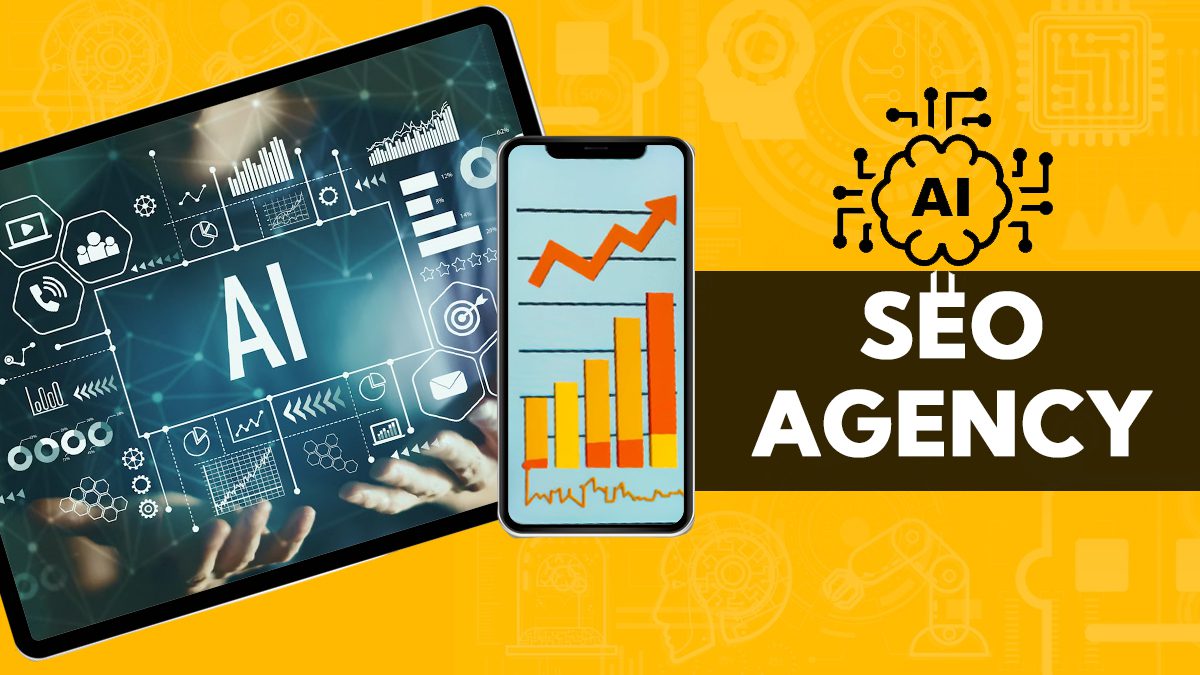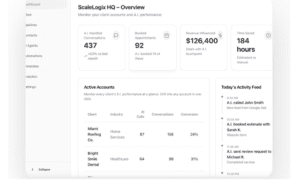Search is changing. Millions of people are now turning to AI models like ChatGPT, Perplexity, and Gemini for answers, not just Google.
But here’s the reality: Google still dominates search. Billions of people use it every day. And its influence isn’t going anywhere fast.
That’s why the best approach isn’t to pick one or the other – it’s to plan for both. A joined-up SEO strategy should help your business show up where it matters most: in Google, in AI results, and across the wider web.
In this guide, we’ll break down what AI SEO actually means, how it fits with traditional SEO, and which agencies are best placed to help you succeed. Because classic search via Google and others still drives the majority of traffic, the smart strategy combines both.
Top AI SEO Agencies (2025)
Below is a list of global AI SEO agencies that stand out – each with experience in both traditional and AI‑driven search. These agencies understand how to bridge AI SEO and classical SEO.
1. The SEO Works (UK / global)
- They explicitly offer AI SEO services (ChatGPT, Google AI Mode, AI Overviews) in addition to traditional SEO.
- They track and improve your visibility in AI platforms using enterprise level tools as a standard part of your campaign with no extra costs.
- They have proven case studies showing how they increased LLM referrals by 20x.
- With multiple awards, 5 star reviews, and a long track record (over 15 years), they maintain credibility.
2. WebFX (USA)
- One of the larger digital marketing firms in the U.S., doing AI‑informed SEO and generative engine optimisation (GEO).
- They serve clients at scale and run complex SEO + AI projects.
3. Builtvisible (UK)
- Known for deep technical SEO, content strategy, data analysis and adapting to new search features.
- Their ability to work with structured data and authority makes them a solid AI SEO partner.
4. NOVOS (UK)
- Specialists in e-commerce SEO that also work on making products visible to AI systems (through schema, structured markup, internal linking).
- Good fit when your business has a heavy product catalogue presence.
5. Re:signal (UK)
- Strong in content strategy and helping brands act as recognised authorities in their niche.
- Skilled in adapting content to AI‑answer formats (FAQs, structured summaries).
6. Siege Media (USA)
- USA agency with broad SEO experience.
- Combine high-quality content with SEO strategy
7. Optimisey (UK)
- One man band acting as consultant.
- Good choice for startups with more accessible pricing
8. Blacksmith Agency (USA)
- USA agency with SEO experience for SMBs.
- Offers LLM / AI SEO services.
How These Agencies Help You Prepare for AI Search
A strong AI SEO agency will:
- Help you restructure your content so it’s easy to surface in AI answers
- Improve your technical SEO so both crawlers and AI can read your site cleanly
- Strengthen your brand’s credibility, with trusted signals and real authorship
- Guide your tone and messaging so it stays human, useful and relevant
- Monitor how your content appears across both search and AI tools
Some also help you build data and content for AI-specific tools (e.g. chatbots, knowledge bases, answer boxes).
What Is AI SEO – and Why It’s Not a Reboot, Just an Expansion
AI SEO refers to optimising for AI-driven platforms and generative search interfaces, so your content can be discovered, cited, or summarised by systems like ChatGPT, Google’s AI Overviews, and similar models.
But this is not a replacement for traditional SEO – it layers on top of it. Many of the same principles apply:
- Clear structure and writing: AI models prefer well‑formatted, well‑explained content
- Authority and credibility: Links, citations, and trust signals matter
- Original, valuable content: To avoid being filtered out as fluff
- Technical soundness: Fast site, correct schema, clean markup – AI and search crawlers both benefit
So an AI‑SEO agency doesn’t throw away the old rules. It adapts them to rank you both in classic search and in AI results.
Why Traditional SEO Still Matters More Than Ever
Yes, AI models are growing fast. But Google is still the biggest driver of online visibility, and likely will be for some time.
Even AI tools often pull their answers from Google-indexed content.
So if your SEO is already solid – fast site, clear structure, helpful content – you’re already on the right track. The key is not to abandon what works, but to extend your reach into the new spaces where people are searching.
This means:
- Staying visible in organic search
- Being recognised in AI-generated responses
- Maintaining content that performs well across both
An agency that only bets on AI and neglects classic SEO is making a risky gamble. The best ones work on both fronts – and ensure your brand is visible where users actually look.
How AI Is Changing Search Behaviour
More people are asking questions like:
- “What’s the best project management tool for a remote team?”
- “What’s the safest dog food brand?”
- “Can I get a refund if a parcel is lost?”
These are now being answered by both Google and AI interfaces – often instantly.
That means SEO strategies need to shift:
- Answer questions clearly – in plain English
- Build trust – through content, design and links
- Show relevance – by addressing the intent behind the search
If your content is useful, original, well-explained and fast to load, it has a good chance of being pulled into both search results and AI summaries.
What Makes an SEO Agency AI-Ready?
AI-ready agencies don’t throw out the rulebook. They evolve their processes. As well as continuing to focus on what’s always worked – clear structure, technical stability, brand authority and credible content.
Here’s what to look for:
- Structured content
Well-organised headings, concise answers, and clear layouts - Schema markup
Adds context to help both AI and search engines understand your content - Reputation-building
From mentions and reviews to strong author pages and thought leadership - Adaptability
They stay up to date with how AI tools select and present content - No shortcuts
AI rewards quality and originality. Agencies that chase hacks will be left behind - Experience across industries
Because AI responses pull from a wide range of sources, industry knowledge helps
What to Look For in a Strong AI SEO Agency
Here are qualities that distinguish agencies able to deliver results across both AI and traditional search:
- Proof of adapting to change
They must show how they’ve handled past shifts in search – and now AI. - Dual performance metrics
They should track both standard SEO KPIs (traffic, rankings) and AI visibility (citations in AI, inclusion in summaries). - Content strategy built for AI
Use of FAQ, structured headings, entity-based modelling, schema. - Technical & schema expertise
They must be comfortable with structured data, markup, JSON‑LD, etc. - Strong reputation and trust signals
Because AI models often bias content from authoritative sources. - Transparency & reporting
You should see how they adapt strategy based on AI and search algorithm shifts. - Global reach or multilingual support (if needed)
To serve companies targeting multiple markets.
What AI SEO Doesn’t Mean
There’s been a lot of noise about AI changing everything in search. Some of it’s useful. A lot of it isn’t. So let’s clear up a few common misconceptions:
1. It’s not a totally separate strategy
You don’t need to tear up your existing SEO plan and start again. AI SEO isn’t a new playbook – it’s just a new layer on top of what already works.
The principles remain the same:
- Clear, structured writing
- Content that answers real questions
- Fast-loading, technically sound websites
- Earning trust through authority and helpfulness
If anything, AI tools reward clarity and simplicity even more than traditional search engines. So if your SEO has been focused on long-term quality, you’re already ahead of the curve.
2. It doesn’t ignore Google
A lot of AI tools pull from Google-indexed content. They cite top-performing pages, summarise the best answers, and lean heavily on high-authority sources.
So ranking well in Google is still a big part of being seen in AI-driven responses.
If your pages don’t rank in Google, they’re unlikely to be surfaced in AI tools. And if your site isn’t technically sound, it may not be indexed at all – by either system.
Good SEO is what feeds the AI models in the first place.
3. It’s not about using AI to write all your content
AI can be a helpful tool – for outlines, keyword ideas, or speeding up research. But relying on it to write entire articles or pages without editing leads to problems:
- The tone often feels flat or robotic
- Information can be outdated or wrong
- The same phrases and ideas appear everywhere (making your content blend in, not stand out)
- It can create content for the sake of it, not because there’s actual demand
Good content still needs a human touch – to guide the structure, fact-check, bring in personality, and ensure it genuinely helps the reader. AI can support that process, but it shouldn’t replace it.
In Summary
AI tools are changing how people search – but they haven’t replaced traditional search. They’ve simply added another layer.
If your SEO is already working – if you’re seeing steady traffic, engagement, and conversions – you are building on solid ground.
The best SEO agencies already know this. They’ve built long-term strategies that are now naturally extending into the AI space.
If you want to show up in both Google and in AI-generated results, the principles stay the same:
- Helpful, human content
- Clear structure and signals
- Credibility built over time
- Technical stability
- Ongoing effort
And most importantly: work with agencies who’ve already adapted to change – and proven they can get results from it.































